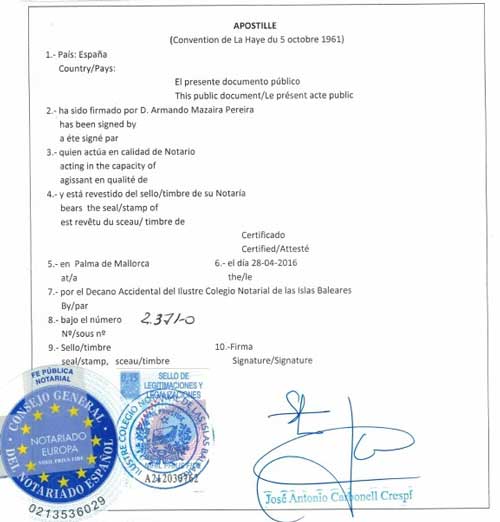
Schmidt & Schmidt covers the full spectrum of legalization services for documents issued in Spain.
Spain joined the Hague Convention on the Simplified Authentication of Documents on 27 July 1978; the Convention entered into force on 25 September 1978.
The apostille, or the “Hague apostille” is a certificate that authenticates the origin of a public document (e.g., a birth, marriage or death certificate, a judgment, an extract of a register or a notarial attestation). It confirms the authenticity of the signature and the authority of an official who signed the public document.
Documents issued in Spain are certified with an apostille in accordance with the Hague Convention of 1961 are recognized in all Member States of the Hague Convention and do not require any other form of certification, such as consular legalization, which considerably reduces the costs and time required for the certification of documents. So far, more than 120 states have joined the Convention.
The apostille is not sufficient for use in the states that are not party to the Hague Convention. In this case, consular legalization applies to a public document.
Please note that the Consular Office does not provide legalization or apostille services for documents issued within Spain.
Designated Competent Apostille Authorities in Spain
In Spain, there are a few designated competent authorities from where you can obtain an apostille for your official documents. The specific authority responsible for the procedure varies depending on the type of document: notarial documents, for instance, must be apostilled by the notarial colleges or the appointed notaries associated with them. On the other hand, judicial documents require apostilling by judicial authorities or officials. The specific competencies of these authorities are outlined in the Spanish Royal Decree 1497/2011.
To summarize, the provision of apostilles is handled by specific agencies, depending on the issuing authority of the document. These apostilles are provided at no cost, with some administrative documents requiring prior acknowledgment of the signature.
Below are the bodies responsible for issuing apostilles in different cases:
-
Public Administrative Documents and Judicial Documents: for these document types, you can approach any of the following three agencies:
- Central Citizen Service Office of the Ministry of Justice.
- Government Secretariats of the Superior Courts of Justice and of the cities of Ceuta and Melilla.
- Territorial Management of the Ministry of Justice and Delegated Offices of Ceuta and Melilla.
- Public Judicial Documents from the National Court and the Supreme Court: in this case, you will need to contact the Secretaries of Government of the respective courts.
- Notary Documents and Private Documents with Authenticated Signatures: for documents that have been notarized and authenticated by a notary, you should approach the notarial association or the notary delegated to issue apostilles.
The apostille in Spain is a square stamp in Spanish with the obligatory heading "Apostille" and a reference to the 1961 Hague Convention in French (Convention de La Haye du 5 octobre 1961). The apostille certificate’s sides will be at least 9 centimeters long.
Types of documents

| Can be apostillized | Cannot be apostillized |
|---|---|
|
|
Specific aspects and document requirements for the apostille in Spain
Spain is among the 120 countries that recognize and issue apostilles in accordance with the Hague Convention of 5 October 1961. The apostille serves as a confirmation of the official status of a document.
Document Requirements for Apostille in Spain
You can obtain an apostille in Spain by choosing one of the two options:
- In-Person Appearance: you can personally visit one of the government agencies mentioned above with the documents requiring apostilles. If necessary, ensure that you have obtained the required acknowledgment of signatures beforehand.
- Submission by Post: alternatively, you can send your documents by post to the relevant agencies.
Keep in mind that obtaining an apostille may take considerable time, so it's advisable to prepare well in advance if you need to legalize documents with an apostille for use in a foreign country.
If you find yourself in need of information regarding the apostille process in Spain, Schmidt & Schmidt is here to assist you. With our expertise, we can provide you with the guidance and support you require. Feel free to reach out to us for any inquiries or assistance you may need.
The apostille is issued in a uniform format. In Spain, it has the form of a printed sticker with a handwritten signature of an official, an official seal, and a hologram.
In cases where apostilles are not recognized, holders of foreign documents will need to legalize them instead. However, If the country of destination of the document recognizes and issues apostilles, then legalization is unnecessary.
Legalization of Spanish educational documents for use abroad
For educational documents issued in Spain, such as school reports, university degree certificates, transcripts of records, enrollment certificates, and other school or university certificates, to be recognized and valid abroad, they must undergo a certification process through legalization.
Different types of transcripts or certificates have specific guidelines for legalization. It is recommended to visit the website of the Ministry of Education and Vocational Training for detailed information. If you have documents other than university degrees, please visit for the relevant information.
Regarding official non-higher education documents issued by educational establishments in an autonomous region, the legalization process will typically include one or more of the following steps:
- Certification by the Department of Education or equivalent in the respective region.
- Legalization by the Legalizations Service of the Ministry of Foreign Affairs, European Union and Cooperation, Madrid.
- Subsequent legalization by the foreign embassy or consulate in Spain of the country where the document is intended to be used.
For unofficial documents issued by private institutions, the legalization process follows these steps:
- Notarization by notaries.
- Legalization by notarial associations (refer to the list of notarial associations in Spain).
- Legalization by the Legalizations Section of the Ministry of Justice
- Further legalization by the Legalizations Service of the Ministry of Foreign Affairs, European Union and Cooperation, Madrid.
- Final legalization by the foreign embassy or consulate in Spain of the country where the document is intended to be used.
Recognition of the authenticity of public documents within the EU
Civil status certificates and certificates of marriageability, which are issued by one of the contracting states according to the model of the Convention of the International Commission (CIEC Convention) for Civil and Civil Status Affairs (CIEC), are exempt from any formality in Spain.
The treaty simplifying procedures for document recognition has been adopted by numerous countries. According to this text, Member States do not require legalization for mutual recognition, but a stamp or apostille is necessary. To obtain it, please contact the Ministry of Justice at Calle de la Bolsa, Madrid.
Furthermore, there are additional agreements that exempt certain documents from the legalization requirement, such as the Athens Convention and the Vienna Convention:
- Athens convention, signatory states: Austria, Spain, France, Greece, Italy, Luxembourg, the Netherlands, Poland, Portugal, Turkey.
- London convention, signatory states: Austria, Belgium, Czech Republic, Estonia, France, Spain, Greece, Ireland, Iceland, Italy, Liechtenstein, Luxembourg, Moldova, Norway, Netherlands, Poland, Portugal, Spain, Romania, Russia, United Kingdom, Spain, Switzerland, and Turkey.
Contracting states of the Vienna CIEC Convention of 08.09.1976 (issuance of multilingual extracts from civil status registers: birth, marriage, and death certificate) are:
- Austria, Germany, Bosnia-Herzegovina, Bulgaria, Estonia, France, Italy, Cape Verde, Cyprus, Lithuania, Luxembourg, Macedonia, Moldova, Montenegro, Netherlands, Poland, Portugal, Romania, Switzerland, Serbia, Slovenia, Spain, Turkey.
Regulation on public documents (EU) 2016/1191 of 6 July 2016
Furthermore, Regulation (EU) 2016/1191 of 6 July 2016 on public documents simplifies the circulation of certain public documents that must be presented in an EU Member State and have been issued in another EU Member State, thus exempting public documents from the confirmation of authenticity with the Apostille with the aim of reducing administrative burden and costs for citizens.
Consular legalization of Spanish documents for use abroad
Consular legalization is the process of authenticating or certifying a legal document so a foreign country's legal system will recognize it as with full legal effect that is carried out by the diplomatic or consular mission of the country in which the document is to be used.
Consular legalization is more complex, time-consuming and costly than the simpler apostille procedure. Whereas apostille is usually issued within one step, consular legalization requires several pre-certifications before a public document can be certified at the embassy or consulate of the destination country in Spain.
It is a common requirement that the document has to be translated into the official language of the destination country before submission to the embassy. It is up to the diplomatic mission to decide about the authentication procedure.
The main differences between an apostille and consular legalization of documents
The common feature between apostille and consular legalization is that they authenticate an official document for presentation to institutions in another country. However, they have many differences.
| Apostille | Consular legalization | |
|---|---|---|
| Legal effect | Can be used in all countries that are party to the Hague Convention on the Simplified Legalization of Documents. | Use between States one or both of which is not a member of the Hague Convention, or where one of the contracting States has protested the accession of the other. |
| Difficulty | Moderate. To obtain an apostille, contact the competent apostille authority of the state of origin of the document. | High. For consular legalization, various inland authorities and a diplomatic mission of the state of destination must be involved. |
| Pre-certification | Usually not required. | Is obligatory. |
| Attestation at the state of destination embassy in the state of origin of the document | No need to contact the Consulate of the country of destination. | Is the final step of legalization. |
Apostille and consular legalization in all cities of Spain
Schmidt & Schmidt provides apostille and consular legalization services for public documents originating from all regions across Spain. We handle the entire process, from document review to obtaining the necessary certifications, ensuring that your documents are valid and recognized internationally. With our reliable services, you can confidently use your Spain public documents abroad.
Procurement of documents from Spain
If the important documents are lost or damaged, or current copies of the documents are needed, the re-issue of the documents is required. It is not unusual for people outside Spain to encounter difficulties with obtaining new documents when abroad. Our consultants will help you procure new documents from Spain remotely, and we can arrange for your documents to be sent by courier anywhere in the world.
Certified translation of documents from Spain
Copies and transcripts of civil status documents can be translated into any language by a sworn translator in Spain or the translation can be done in the country of destination. We offer certified translations of civil status documents with further certification. The cost of the work is calculated according to the volume of the document in question.
Does the translation have to be apostillized?
Any foreign document issued in one country and used in another country must be legalized for use abroad. Therefore, the authenticity of a certified translation from Spain needs to be certified by an apostille. Consequently, many authorities may not accept certified translations from Spain if the translation has not been properly authenticated in Spain for use abroad. To avoid this confusion, translations should better be made in the state of the destination of the document.







































